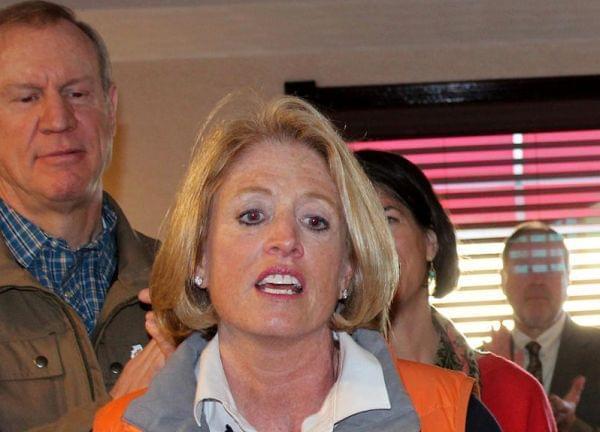Comptroller Munger Not Immune To Disagreeing With Gov. Rauner

Gov. Bruce Rauner and Comptroller Leslie Munger in Maryville, Ill. in January. Camille Phillips/KWMU
Illinois' new comptroller was hand-picked by Gov. Bruce Rauner, who made the appointment with the intention of keeping a Republican in that office for as long as possible. But Comptroller Leslie Munger hasn't been the doormat some Capitol-watchers had expected her to be.
Soon after Rauner took office, he issued an executive order to halt the payment of unions from state paychecks.
Instead of complying with the order, Munger sought the legal opinion of Attorney General Lisa Madigan -- a Democrat -- who declared the action was out of the governor's authority.
At the same time, Munger has praised Rauner's proposed budget for not spending more than the state is taking in ... a constitutional requirement rarely followed in Illinois.
But over $2 billion of the governor's plan is predicated on savings from a suggestion to switch state workers into a system with less benefits -- something that Democratic leaders say has little chance of actually happening.
Munger ignored that provision, instead saying next year's budget is far from final.
"What the governor has put forth in his budget address is a starting point for discussion for how to get us to what I think will be the first balanced budget that we've had in more than a decade,"she said. "From there we'll see what we can and cannot pay."
Munger says her office is focused on dealing with this year's budget, which has run out of money with over three months left in the fiscal year.
Though state money is supposed to last through July 1, funding for programs like subsidized childcare, prison guard salaries and court reporters began drying up last month.
Munger says she's doing what she can to normalize funding to these programs, and that includes ballooning the backlog back up to $8 billion.
"We are working with them to pay them what we can, to put in place a predictable payment stream so they can budget for what they are going to get even though it's not everything we owe them," she said.
At one point, the state's bill backlog stacked up to nearly $10 billion.
The debt had been paid down significantly in the last few years -- at one point to $4 billion -- but the expiration of a temporary income tax hike in January has cut state resources significantly.
This year's budget was passed on the expectation of an extension of that tax rate, but that plan was abandoned when former Gov. Pat Quinn lost to Rauner in November.

